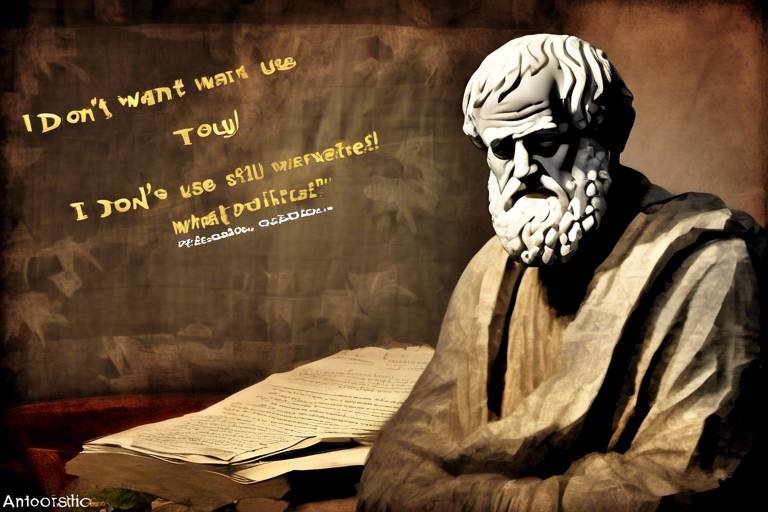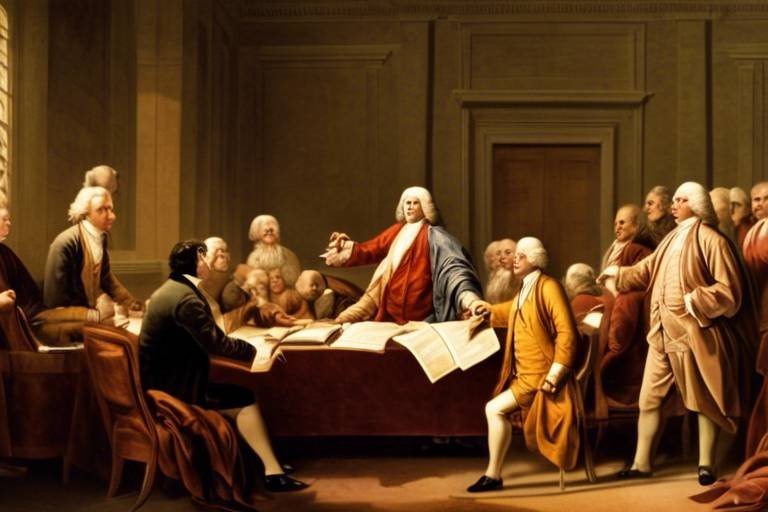The Philosophy and Politics of Consumer Culture
In today's world, the intricate relationship between consumer culture, philosophical perspectives, and political implications is more relevant than ever. Consumerism is not just about buying goods; it’s a lens through which we view our identities, societal values, and the economic systems that govern our lives. Have you ever thought about how the brands we choose or the products we buy shape who we are? This article dives deep into the fascinating interplay of these elements, revealing how consumer culture influences individual choices and collective behavior.
Understanding the origins of consumer culture is essential. It’s like peeling back the layers of an onion to reveal the core of our modern existence. The roots of consumerism can be traced back to the Industrial Revolution, a pivotal period that marked the shift from agrarian economies to industrialized ones. This transformation not only changed how goods were produced but also how they were consumed. As factories sprang up, mass production made products more accessible, leading to an explosion of consumer goods in the market.
Fast forward to the rise of globalization in the late 20th century, and consumer culture evolved even further. The advent of digital markets has created a global village where consumers can purchase products from the other side of the world with just a click. This shift has not only changed our shopping habits but has also influenced our values and identities. The question we must ask ourselves is: how does this constant bombardment of choices affect our lives and our society?
Various philosophical frameworks provide rich insights into consumer culture. Thinkers like Karl Marx and Thorstein Veblen have examined the implications of materialism, identity, and the ethics of consumption. Their views challenge us to reflect on our consumer choices. Are we merely buying products, or are we buying into a lifestyle, a status, or an ideology? The moral implications of our consumption are profound and worthy of exploration.
Materialism significantly influences personal identity. In our society, consumer goods often serve as symbols of status and self-expression. For many, the brands we wear or the gadgets we own become extensions of ourselves. It’s as if we wear our identities on our sleeves—literally! The brands we choose can reflect our values, aspirations, and even our social circles. But at what cost?
Brands play a crucial role in shaping self-perception. They create narratives that consumers buy into, influencing how we see ourselves and how we wish to be seen by others. Think about it: when you see someone sporting the latest smartphone or designer handbag, what do you assume about their lifestyle? This psychological impact of branding can be both empowering and limiting. It’s a double-edged sword that can elevate our self-esteem or trap us in a cycle of comparison.
Consumerism often reflects social hierarchies. The products we buy can reinforce or challenge our social status, impacting social mobility and class dynamics. For instance, luxury brands are often associated with wealth and exclusivity, creating a divide between those who can afford them and those who cannot. This dynamic raises important questions about equality and accessibility in our consumer-driven society.
As consumers, we are increasingly faced with ethical considerations in our behavior. The moral responsibilities of consumers encompass sustainability, fair trade, and the broader impact of consumption on global inequalities. Are we aware of where our products come from and the conditions under which they are made? The choices we make at the checkout counter can have far-reaching implications for the world around us.
Consumer culture is deeply intertwined with political and economic systems. It’s a complex dance where consumer behavior influences and is influenced by political policies, corporate practices, and economic trends. Understanding this relationship is crucial for grasping the full picture of modern consumerism.
Consumer rights are a vital aspect of political discourse. Over the years, the evolution of consumer protection laws has aimed to safeguard consumer interests and ensure fair practices in the marketplace. Governments play a significant role in regulating markets, but how effective are these regulations in protecting consumers from exploitation?
Globalization has transformed consumer culture worldwide. With global trade and cultural exchange, multinational corporations have a significant impact on local economies and consumer habits. This raises questions about cultural homogenization: are we losing our unique identities in the pursuit of global consumerism?
The landscape of consumer culture is constantly evolving. As we look ahead, we can speculate on future trends, such as the rise of ethical consumption, driven by a growing awareness of sustainability and social responsibility. Technological advancements will continue to shape our shopping experiences, while climate change will undoubtedly influence consumer behavior in profound ways. How will we adapt to these changes, and what will the future of consumer culture look like?
- What is consumer culture? Consumer culture refers to the societal norms and practices surrounding the consumption of goods and services.
- How does consumerism affect identity? Consumerism influences identity by shaping how individuals express themselves through the brands and products they choose.
- What are the ethical implications of consumerism? Ethical implications include considerations of sustainability, fair trade, and the impact of consumption on global inequalities.
- How does globalization impact consumer culture? Globalization affects consumer culture by facilitating the spread of brands and products across borders, often leading to cultural homogenization.

The Historical Context of Consumer Culture
Understanding the origins of consumer culture is essential to grasping its profound impact on modern society. The roots of consumerism can be traced back to the Industrial Revolution in the late 18th century, a period marked by rapid industrial growth and urbanization. This era not only transformed economies but also altered the way people lived, worked, and consumed goods. With factories springing up and mass production becoming the norm, consumer goods became more accessible than ever before, leading to a significant shift in societal values.
As we moved into the 20th century, the rise of advertising and marketing further propelled consumer culture. Companies began to understand the psychology of consumers, using targeted advertising to create desires rather than just meet existing needs. This shift is encapsulated in the idea of creating a brand identity, where products became symbols of status and lifestyle. The post-World War II era, in particular, saw an explosion of consumer goods as economies boomed, leading to a culture where owning the latest products became a measure of success and happiness.
Fast forward to the late 20th and early 21st centuries, and we find ourselves in a world deeply influenced by globalization and digital markets. The advent of the internet has revolutionized how consumers interact with brands and each other. Online shopping, social media, and digital marketing have created a new landscape where consumer choices are influenced by global trends and local cultures alike. The accessibility of information and the ability to compare products and prices at the click of a button have empowered consumers, but they have also complicated the relationship between identity and consumption.
To illustrate the evolution of consumer culture, consider the following table, which outlines key milestones in its historical development:
| Era | Key Developments |
|---|---|
| Industrial Revolution | Mass production of goods; rise of factories; increased accessibility of consumer goods. |
| Post-WWII | Economic boom; emergence of advertising; consumer goods as symbols of status. |
| Late 20th Century | Globalization; rise of multinational corporations; growth of digital markets. |
| 21st Century | Online shopping; social media influence; ethical consumption trends. |
As consumer culture continues to evolve, it is crucial to reflect on its historical context. By understanding how we arrived at this point, we can better navigate the complexities of our current consumer landscape. The interplay between economic systems, societal values, and individual choices creates a rich tapestry that defines our identities and influences our behaviors. So, how do we reconcile our desires with the implications of our consumption? That’s a question worth pondering as we delve deeper into the philosophical and political dimensions of consumer culture.
- What is consumer culture? Consumer culture refers to the societal trend where buying and consuming goods becomes a central aspect of social identity and lifestyle.
- How did consumer culture originate? It originated during the Industrial Revolution, which facilitated mass production and increased accessibility to goods.
- What role does advertising play in consumer culture? Advertising shapes consumer desires, creating a need for products that may not be essential, thus influencing purchasing behavior.
- What are the ethical implications of consumerism? Ethical consumption raises questions about sustainability, fair trade, and the social impact of our buying choices.

Philosophical Perspectives on Consumerism
Consumerism is not just a mere act of buying; it's a profound reflection of our desires, values, and identities. Philosophers have long debated the implications of consumer culture, examining how it shapes our understanding of self and society. At its core, consumerism raises fundamental questions: What does it mean to consume? How do our purchases reflect our identities? And, importantly, what ethical responsibilities do we have as consumers?
One significant philosophical framework that sheds light on consumerism is **materialism**. Materialism posits that the material world, including possessions and wealth, plays a crucial role in shaping our identities. In contemporary society, many individuals find themselves defining their self-worth through the lens of what they own. This perspective can lead to a cycle where people equate their value with the brands they wear or the gadgets they possess. For instance, someone might feel a sense of accomplishment and status by owning the latest smartphone or luxury car, illustrating how consumer goods serve as symbols of personal identity.
Moreover, the impact of **branding** cannot be understated. Brands have become more than just labels; they are now intertwined with our self-perception. When we choose to buy a particular brand, we are often making a statement about who we are or aspire to be. This phenomenon raises intriguing questions about authenticity. Are we genuinely expressing ourselves through our purchases, or are we merely conforming to societal expectations? The psychological impact of branding is profound, as it can bolster our self-esteem or, conversely, create feelings of inadequacy if we cannot afford certain items.
Another critical aspect of consumerism is its relationship with **social status**. Consumption patterns often reflect and reinforce social hierarchies, creating a complex web of class dynamics. For example, in many cultures, luxury items are seen as markers of social standing. The pursuit of these goods can lead to a never-ending cycle of consumption, where individuals strive to keep up with societal expectations. This dynamic can have significant implications for social mobility, as those unable to participate in this consumer race may find themselves marginalized. In a world where social media amplifies these status signals, the pressure to consume can feel overwhelming.
As we navigate these philosophical perspectives, it becomes clear that consumerism is not merely an economic phenomenon but a deeply embedded aspect of our social fabric. The ethical implications of our consumption choices are increasingly relevant in today’s world. Are we considering the environmental impact of our purchases? Are we supporting fair trade practices? These questions challenge us to reflect on our responsibilities as consumers and the broader consequences of our choices.
In conclusion, the philosophical perspectives on consumerism invite us to engage in critical reflection about our consumption habits. By understanding how materialism, branding, and social status interplay, we can better navigate the complexities of consumer culture. Ultimately, this exploration encourages us to consider not just what we buy, but why we buy it and what it says about who we are.
- What is consumerism? Consumerism refers to the societal focus on acquiring goods and services, often driven by the desire for status and identity.
- How does consumerism affect identity? Consumerism shapes identity by linking personal worth to material possessions and brand associations.
- What are the ethical implications of consumerism? Ethical implications include considerations of sustainability, fair trade, and the impact of consumption on global inequalities.
- Can consumerism influence social status? Yes, consumption patterns can reflect and reinforce social hierarchies, affecting perceptions of status and class dynamics.

Materialism and Identity
In today's world, the concept of materialism is more than just a fascination with possessions; it has become a fundamental part of how we define ourselves. The items we own often serve as symbols of status, acting as indicators of our social standing and personal identity. Think about it: when you walk into a room, what do you notice first? The clothes people wear, the gadgets they flaunt, and the brands they display all contribute to a narrative about who they are. This phenomenon is not merely superficial; it shapes our interactions, influences our aspirations, and even affects our mental health.
For many, the pursuit of material goods is intertwined with the quest for identity. The car you drive, the phone you carry, and even the coffee you sip can tell a story about your lifestyle and values. In a society where consumer culture is king, these possessions can become extensions of ourselves. They fill the gaps in our self-perception, allowing us to project an image that aligns with our desired identity. However, this raises an important question: at what point does the quest for material possessions overshadow our intrinsic values?
Moreover, the impact of materialism on identity is not uniform across different demographics. For instance, young adults today are often bombarded with messages that equate worth with wealth. Social media platforms amplify this pressure, showcasing curated lifestyles that many strive to emulate. As a result, the need for validation through material goods can lead to feelings of inadequacy when one cannot keep up. This cycle can create a distorted sense of self, where identity is heavily reliant on external validation rather than internal values and self-worth.
Interestingly, materialism can also serve as a double-edged sword. While it can foster a sense of belonging and community among those who share similar tastes, it can also alienate individuals who feel excluded or unable to participate in this consumerist culture. The social implications are profound, as individuals may find themselves trapped in a cycle of consumption, constantly chasing the next big thing in an effort to fit in. This can lead to a disconnect between who we are and who we aspire to be, creating a tension that many struggle to navigate.
In essence, the relationship between is complex and multifaceted. It intertwines our social interactions, influences our self-perception, and shapes our values. As we continue to navigate a world driven by consumerism, it’s crucial to reflect on how our possessions define us and to consider the deeper implications of our consumption choices.
- How does materialism affect mental health? Materialism can lead to anxiety and depression, as individuals may feel pressured to keep up with societal standards of success.
- Can materialism be positive? In some cases, material possessions can enhance life experiences and foster social connections, but it’s essential to maintain a balance.
- What are the alternatives to a materialistic lifestyle? Emphasizing experiences over possessions, practicing gratitude, and focusing on relationships can lead to a more fulfilling life.

Branding and Self-Perception
Branding is more than just a logo or a catchy tagline; it’s a powerful force that shapes our self-perception and influences our choices in profound ways. Think about it: when you wear a particular brand, what are you really saying about yourself? The clothes we choose, the gadgets we flaunt, and even the food we eat often serve as extensions of our identity. In a world where consumerism reigns supreme, our affiliations with brands can become a reflection of our values, aspirations, and social status.
Consider the following: brands craft narratives that resonate with us on an emotional level. They don’t just sell products; they sell lifestyles. For instance, when you think of a luxury brand like Gucci, it’s not just about the handbag; it’s about exclusivity, status, and a certain kind of lifestyle that many aspire to. This emotional connection can lead to a phenomenon known as brand loyalty, where consumers feel a sense of belonging to a brand community. It’s a bit like having a favorite sports team; you wear their colors proudly and feel a connection to others who do the same.
Moreover, branding plays a crucial role in shaping our self-image. When we align ourselves with certain brands, we often feel that we are projecting a specific image to the world. This can be empowering but also problematic. For example, a teenager might choose to wear a particular sneaker brand to fit in with peers, believing it enhances their social standing. However, this can lead to a cycle where self-worth is tied to material possessions, raising questions about authenticity and self-acceptance.
It’s fascinating to see how branding influences not only individual choices but also collective behavior. As consumers, we often engage in conspicuous consumption—the act of buying expensive items to showcase wealth and status. This behavior can create a ripple effect, where others feel pressured to keep up, leading to a culture of comparison and competition. In this sense, branding becomes a double-edged sword: it can foster community and identity, but it can also perpetuate insecurity and materialism.
To further illustrate the impact of branding on self-perception, let’s take a look at a simple table that summarizes how different brands evoke various self-identities:
| Brand | Identity Evoked |
|---|---|
| Apple | Innovative, Trendsetter |
| Nike | Active, Competitive |
| Rolex | Luxury, Success |
| Patagonia | Environmentally Conscious, Ethical |
This table highlights how brands can evoke specific identities and values. For instance, wearing a Patagonia jacket might signal to others that you care about the environment and sustainability, while sporting a Rolex could convey wealth and success. The brands we choose to associate with can thus shape not only how we see ourselves but also how others perceive us.
In conclusion, branding is a powerful tool that shapes self-perception in today’s consumer-driven society. It influences our choices, reflects our values, and even affects our social interactions. As we navigate this complex landscape, it’s essential to be mindful of the brands we choose to align with and the messages they convey about who we are. After all, in a world saturated with choices, our self-identity is often intertwined with the brands we embrace.
- How does branding influence consumer behavior? Branding influences consumer behavior by creating emotional connections and perceived value, leading to loyalty and preference for certain products.
- Can branding affect self-esteem? Yes, branding can affect self-esteem as individuals may tie their self-worth to the brands they use, impacting their identity and social interactions.
- What is the role of social media in branding? Social media amplifies branding by allowing brands to engage directly with consumers, shaping perceptions and fostering community around brand identities.

Consumerism and Social Status
Consumerism plays a pivotal role in shaping our social status, often acting as a mirror reflecting the values and hierarchies within society. In a world where the latest gadgets, fashion trends, and luxury items are constantly marketed to us, it's easy to see how our consumption choices can elevate or diminish our perceived social standing. For many, the act of purchasing is not merely about acquiring goods; it's about making a statement. This phenomenon can be likened to a peacock displaying its feathers—it's all about showcasing one's worth and status.
Consider how certain brands have become synonymous with social prestige. Think of high-end labels like Gucci, Chanel, or Rolex. Owning products from these brands can signal wealth and exclusivity, creating a sense of belonging to an elite group. This association often leads to a cycle where individuals strive to own these items not just for their utility but for the social validation they provide. In a way, consumer goods transform into badges of honor, marking one's place in the social hierarchy.
However, this relationship between consumerism and social status is not without its complexities. While some consumers may use their purchasing power to climb the social ladder, others may find themselves trapped in a cycle of debt and overconsumption, desperately trying to keep up with societal expectations. This creates a paradox where the pursuit of status through consumption can lead to financial instability, ultimately undermining the very status one seeks to achieve.
Moreover, consumerism can also challenge traditional social hierarchies. As new brands emerge and cultural dynamics shift, the definition of status is continually evolving. For instance, the rise of sustainable brands and ethical consumption has led to a new kind of prestige—one that values conscious choices over mere luxury. This shift suggests that social status is not solely dictated by wealth but can also be influenced by values and ethics.
To illustrate this dynamic further, let's take a look at the following table that summarizes how different consumption patterns can reflect social status:
| Consumption Pattern | Social Status Implication |
|---|---|
| Luxury Brand Purchases | High Status, Wealthy |
| Sustainable and Ethical Brands | Conscious Consumer, Emerging Status |
| Fast Fashion | Trendy but Potentially Lower Status |
| Second-Hand Goods | Resourceful, Eco-Conscious |
In conclusion, the interplay between consumerism and social status is a complex web that reflects broader societal values and individual aspirations. It raises critical questions about identity, belonging, and the true cost of our choices. As consumer culture continues to evolve, so too will the narratives surrounding status, challenging us to rethink what it means to be "in vogue" in a rapidly changing world.
- How does consumerism affect social mobility?
Consumerism can create barriers to social mobility when individuals feel pressured to spend beyond their means to maintain a certain status. However, it can also provide opportunities for upward mobility through the success of new brands and ethical consumption practices.
- Are there alternatives to traditional consumerism?
Yes! Alternatives such as minimalism, second-hand shopping, and supporting local businesses can help individuals resist the pressures of consumerism while still expressing their identities.
- How can brands influence social status?
Brands can shape social status by creating associations with luxury, exclusivity, or ethical practices. The way a brand markets itself can significantly impact how consumers perceive their social standing when they purchase its products.

Ethics of Consumption
The have become a focal point in today's society, where the choices we make as consumers resonate far beyond our immediate needs. As we navigate through a world filled with products and services, it's crucial to recognize the moral responsibilities that accompany our purchasing decisions. Each item we buy is not just a transaction; it carries with it a story of its production, the labor behind it, and its impact on the environment. This realization prompts us to question: are we merely consumers, or are we also stewards of the planet and advocates for social justice?
At the heart of ethical consumption lies the principle of sustainability. More than ever, consumers are becoming aware of the environmental consequences of their choices. From the carbon footprint of fast fashion to the waste generated by single-use plastics, the implications of our consumption habits are staggering. As a result, many individuals are opting for products that are eco-friendly, made from sustainable materials, or produced through ethical labor practices. This shift toward more conscious consumerism reflects a growing understanding that our buying power can either contribute to or combat environmental degradation.
Furthermore, ethical consumption also encompasses the idea of fair trade. This concept emphasizes the importance of equitable trade relationships that benefit producers in developing countries. By choosing fair trade products, consumers can support farmers and artisans who receive fair wages and work in safe conditions. It’s a way of saying no to exploitation and yes to social equity. Imagine sipping your morning coffee, knowing that the beans were sourced ethically and that the farmers were paid fairly. This awareness transforms a simple act into a powerful statement.
However, the journey towards ethical consumption is not without its challenges. The market is flooded with labels and certifications, making it difficult for consumers to discern which products genuinely uphold ethical standards. This complexity can lead to greenwashing, where companies falsely promote their products as environmentally friendly to attract socially conscious buyers. Thus, it becomes imperative for consumers to educate themselves and dig deeper into the brands they support. Are they genuinely committed to ethical practices, or is it merely a marketing ploy?
In light of these considerations, we can summarize the key aspects of ethical consumption in the following table:
| Aspect | Description |
|---|---|
| Sustainability | Choosing products that minimize environmental impact. |
| Fair Trade | Supporting equitable trade practices that benefit producers. |
| Transparency | Demanding clarity about product sourcing and production processes. |
| Community Impact | Considering how purchases affect local economies and communities. |
Ultimately, the ethics of consumption challenge us to think critically about our roles as consumers. Are we contributing to a cycle of exploitation and environmental harm, or are we making choices that uplift communities and protect our planet? Each purchase is an opportunity to express our values and make a difference. So, the next time you reach for a product, pause for a moment and ask yourself: what story does this item tell, and what impact does my choice have on the world?
- What is ethical consumption? Ethical consumption refers to the practice of purchasing products that are made and sourced in a way that is environmentally sustainable and socially responsible.
- Why is sustainability important in consumer choices? Sustainability is crucial because it helps reduce the negative impact of consumption on the environment, ensuring that resources are available for future generations.
- How can I identify fair trade products? Look for certifications from recognized fair trade organizations on product labels, which indicate that the items meet specific ethical standards.
- What is greenwashing? Greenwashing is a marketing tactic where companies falsely claim that their products are environmentally friendly to attract conscious consumers.

The Political Economy of Consumer Culture
Consumer culture is not just a backdrop to our daily lives; it is a dynamic force that shapes and is shaped by political and economic systems. At its core, the political economy of consumer culture examines how consumer behavior influences political policies and corporate practices, while simultaneously being influenced by them. This intricate relationship creates a feedback loop where consumer choices can drive market trends, which in turn can lead to changes in legislation, corporate strategies, and even global economic patterns.
One of the most compelling aspects of this relationship is the way consumer demand can dictate the direction of political discourse. For instance, when consumers begin to favor sustainable products, companies may feel pressured to adopt greener practices. This shift can lead to governments implementing regulations to support sustainable development, showcasing how consumer preferences can lead to significant political action. Conversely, when political powers prioritize certain economic policies, they can shape consumer behavior by influencing what products are available and how they are marketed.
Moreover, the rise of digital markets has transformed the landscape of consumer culture, creating a new dimension in the political economy. Online shopping platforms have not only changed how we purchase goods but have also altered the way companies engage with consumers. The data collected from these platforms allows corporations to tailor their marketing strategies, often leading to a more personalized shopping experience. However, this raises ethical concerns regarding privacy and data security, prompting discussions about the role of government in regulating these practices.
To better understand the political economy of consumer culture, consider the following key areas:
- Consumer Rights and Regulations: Over the years, consumer protection laws have evolved, reflecting the growing awareness of consumer rights. Governments worldwide have enacted regulations to safeguard consumers from unfair practices, ensuring that their interests are represented in the marketplace.
- Corporate Responsibility: As consumers become more aware of ethical issues, such as labor practices and environmental sustainability, corporations are compelled to adopt responsible practices. This shift not only meets consumer demand but also enhances brand loyalty and reputation.
- Global Trade Dynamics: The interconnectedness of global markets means that consumer culture is influenced by international trade agreements and economic policies. Changes in tariffs or trade regulations can impact product availability and pricing, affecting consumer choices.
In conclusion, the political economy of consumer culture is a fascinating interplay of forces that shapes our identities and societal values. As consumers, we wield considerable power through our choices, which can drive significant changes in political and economic landscapes. Understanding this relationship is crucial for navigating the complexities of modern consumerism and recognizing the impact of our purchasing decisions on the world around us.
- What is the political economy of consumer culture?
The political economy of consumer culture examines how consumer behavior influences and is influenced by political policies and economic systems. - How do consumer choices affect political policies?
Consumer demand can drive market trends, which may lead to changes in legislation and corporate strategies, reflecting the preferences and values of the consumer base. - What role do corporations play in consumer culture?
Corporations respond to consumer preferences by adapting their products and marketing strategies, often prioritizing ethical practices to meet consumer demand. - How has globalization impacted consumer culture?
Globalization has transformed consumer habits by increasing access to diverse products, altering local economies, and enabling multinational corporations to influence consumer choices worldwide.

Consumer Rights and Regulations
Consumer rights and regulations form a vital backbone of modern economic systems, ensuring that individuals are protected within the marketplace. As consumers, we often find ourselves navigating a complex web of products, services, and advertisements, making it essential to understand our rights. But what exactly are these rights? Essentially, they encompass the right to safety, the right to be informed, the right to choose, and the right to be heard. These foundational principles are designed to protect consumers from unfair practices and to promote a fair marketplace.
Historically, the evolution of consumer rights can be traced back to the mid-20th century, when societal awareness began to grow about the need for regulations to protect consumers from exploitation. In the United States, this led to the establishment of the Federal Trade Commission (FTC) in 1914, aimed at preventing unfair business practices. Meanwhile, in Europe, various directives and regulations have been implemented to ensure consumer protection across member states. These regulations not only safeguard consumers but also promote fair competition among businesses, ultimately benefiting the economy as a whole.
In today's digital age, consumer rights have taken on new dimensions. With the rise of e-commerce and online shopping, it has become increasingly important for consumers to understand their rights in a virtual marketplace. For example, the General Data Protection Regulation (GDPR) in the European Union has set a precedent for how consumer data is handled, giving individuals greater control over their personal information. This regulation highlights the importance of transparency and accountability in the digital realm.
Moreover, the role of government in regulating markets cannot be overstated. Governments worldwide have implemented various consumer protection laws to ensure that businesses operate fairly and ethically. These laws often include regulations on advertising, product safety, and warranty requirements. For instance, the Consumer Product Safety Commission (CPSC) in the U.S. oversees the safety of consumer products, ensuring that hazardous items are removed from the market. Such measures not only protect consumers but also foster trust in the marketplace, which is crucial for economic growth.
To further illustrate the impact of consumer rights and regulations, consider the following table that outlines key consumer rights and their implications:
| Consumer Right | Description | Implications |
|---|---|---|
| Right to Safety | Protection against hazardous products | Ensures that products meet safety standards |
| Right to be Informed | Access to information about products and services | Empowers consumers to make informed choices |
| Right to Choose | Access to a variety of products and services | Encourages competition and innovation |
| Right to be Heard | Ability to voice complaints and concerns | Promotes accountability among businesses |
As consumers, it’s crucial to stay informed about our rights and the regulations that govern them. This knowledge not only empowers us to make better purchasing decisions but also enables us to advocate for ourselves and others in the face of unfair practices. So, the next time you make a purchase or engage with a service, remember that you have rights that protect you. Don't hesitate to speak up if you feel those rights are being violated; after all, a well-informed consumer is a powerful force in the marketplace.
- What are the main consumer rights? The main consumer rights include the right to safety, the right to be informed, the right to choose, and the right to be heard.
- How can I report a violation of my consumer rights? You can report violations to local consumer protection agencies or regulatory bodies such as the Federal Trade Commission (FTC) in the U.S.
- What role does the government play in consumer protection? The government establishes regulations and laws to protect consumers from unfair practices and ensure product safety.
- How do consumer rights vary by country? Consumer rights can vary significantly from one country to another, influenced by local laws, cultural values, and economic conditions.

Globalization and Consumer Culture
Globalization has become a defining feature of our modern world, and its impact on consumer culture is profound and multifaceted. As borders dissolve and cultures intermingle, the way we consume goods and services undergoes a significant transformation. Imagine a world where a designer handbag from Italy is just as accessible to someone in a small town in India as it is to someone in New York City. This phenomenon illustrates how globalization has democratized access to products, creating a global marketplace where desires can be fulfilled at the click of a button.
The rise of multinational corporations has played a pivotal role in shaping consumer habits across the globe. Brands like McDonald's, Nike, and Apple are not just companies; they are cultural icons that represent a lifestyle, a status symbol, and a sense of belonging. The allure of these brands often transcends geographical boundaries, leading to a homogenization of consumer preferences. This can be both exciting and concerning—while it fosters a sense of global community, it can also dilute local cultures and traditions.
Moreover, globalization has sparked a cultural exchange that influences consumption patterns. For instance, the popularity of sushi in Western countries or the rise of yoga and wellness products reflects how cultural practices can become mainstream through global interconnectedness. This exchange not only enriches consumer choices but also prompts individuals to explore and adopt new lifestyles. However, it raises questions about authenticity and the potential exploitation of cultural symbols for profit.
In addition, the digital revolution has accelerated the pace of globalization, enabling consumers to shop from anywhere in the world. E-commerce giants like Amazon and Alibaba have made it possible for consumers to access products from different continents without ever leaving their homes. This convenience, however, comes with its own set of challenges, including concerns over sustainability and the environmental impact of shipping goods worldwide. As consumers, we must grapple with the ethical implications of our purchasing decisions in a globalized economy.
The implications of globalization on consumer culture can be summarized in the following table:
| Aspect | Impact |
|---|---|
| Accessibility | Increased access to global brands and products |
| Cultural Exchange | Blending of local and global cultural practices |
| Homogenization | Similar consumer preferences across different regions |
| Environmental Concerns | Increased carbon footprint due to global shipping |
As we navigate this complex landscape, it is crucial for consumers to remain aware of the broader implications of their choices. Are we simply following trends, or are we making informed decisions that reflect our values? The challenge lies in finding a balance between enjoying the benefits of globalization while being mindful of its consequences. Ultimately, the way we consume shapes not just our identities but also the world around us.
- What is globalization?
Globalization refers to the process by which businesses or other organizations develop international influence or start operating on an international scale. - How does globalization affect consumer culture?
Globalization increases access to a variety of products and brands, leading to homogenized consumer preferences and cultural exchange. - What are the ethical concerns related to globalization?
Ethical concerns include sustainability, cultural appropriation, and the impact of global shipping on the environment. - Can globalization harm local cultures?
Yes, the spread of global brands can dilute local traditions and cultural practices, leading to a loss of cultural identity.

Future Trends in Consumer Culture
As we gaze into the crystal ball of consumer culture, it’s clear that the landscape is shifting in exciting and unexpected ways. The rise of ethical consumption is not just a trend; it’s becoming a movement that resonates deeply with consumers who are more informed and conscientious than ever before. People are increasingly seeking products that align with their values, whether that means prioritizing sustainability, supporting local businesses, or advocating for fair trade practices. This shift is akin to a tidal wave, reshaping the shores of traditional consumerism into a more responsible and thoughtful approach to buying.
Technological advancements are also playing a significant role in shaping future consumer behaviors. With the proliferation of artificial intelligence and data analytics, brands are now able to offer personalized shopping experiences that cater to individual preferences and needs. Imagine walking into a store where the products seem to know you better than your closest friend! This level of personalization not only enhances customer satisfaction but also fosters brand loyalty, creating a deeper emotional connection between consumers and companies. As we embrace this technological evolution, the line between physical and digital shopping experiences continues to blur, leading to the rise of omnichannel retailing.
Moreover, climate change is becoming an increasingly pressing issue that will inevitably impact consumer choices. As awareness grows about the environmental consequences of our purchasing decisions, consumers are likely to gravitate toward brands that demonstrate a commitment to sustainability. The future may see a surge in eco-friendly products, with companies adopting greener practices to meet the demands of a more environmentally-conscious public. According to recent studies, over 70% of consumers are willing to pay more for sustainable products, indicating a powerful shift in priorities.
Another fascinating trend is the emergence of the sharing economy. Platforms like Airbnb and Uber have revolutionized how we think about ownership and access. Instead of owning goods, consumers are increasingly opting to share resources, which not only reduces waste but also fosters community connections. This trend reflects a broader cultural shift towards valuing experiences over possessions, urging us to rethink what it means to be a consumer in today’s world.
As we look ahead, it’s vital to consider the implications of these trends on various sectors of the economy. Businesses must adapt to this evolving landscape, or risk being left behind. The brands that thrive will be those that not only recognize these changes but also embrace them wholeheartedly. In this new era of consumer culture, it’s not just about selling products; it’s about building relationships, fostering trust, and creating a positive impact on society and the planet.
- What is ethical consumption? Ethical consumption refers to the practice of purchasing products that are made or sourced in a way that is considered morally right, including considerations for sustainability, fair trade, and humane treatment of workers.
- How is technology changing consumer behavior? Technology is enabling personalized shopping experiences, improving customer service through AI, and facilitating seamless transitions between online and offline shopping.
- What impact does climate change have on consumer culture? Climate change is leading consumers to prioritize sustainable products and brands that demonstrate environmental responsibility, influencing purchasing decisions significantly.
- What is the sharing economy? The sharing economy is an economic model where individuals share access to goods and services, often facilitated by online platforms, reducing the need for ownership and promoting community engagement.
Frequently Asked Questions
- What is consumer culture?
Consumer culture refers to a societal framework where buying and consuming goods and services is a primary means of expressing identity, values, and social status. It encompasses the behaviors, attitudes, and beliefs surrounding consumption and how these elements shape our lives.
- How did consumer culture develop historically?
The roots of consumer culture can be traced back to significant historical events like the Industrial Revolution, which introduced mass production and increased availability of goods. Over time, globalization and digital markets have further transformed consumption patterns, making products more accessible worldwide.
- What are the philosophical perspectives on consumerism?
Philosophical perspectives on consumerism often explore themes such as materialism, identity, and ethics. Thinkers from various backgrounds analyze how consumer choices reflect our values, the moral implications of our consumption habits, and the impact on our personal and collective identities.
- How does materialism influence identity?
Materialism plays a significant role in shaping personal identity, as consumer goods often serve as symbols of status and self-expression. People may associate their worth and identity with the brands they choose, which can lead to both positive and negative implications for their self-perception.
- What is the relationship between branding and self-perception?
Branding significantly affects how individuals perceive themselves. Brands often create emotional connections and convey specific lifestyles, influencing consumers to align their identities with these brands. This connection can enhance self-esteem but may also lead to unhealthy comparisons and consumer pressure.
- Are there ethical considerations in consumer behavior?
Yes, ethical considerations are increasingly vital in consumer behavior. Issues like sustainability, fair trade practices, and the broader impact of consumption on global inequalities prompt consumers to reflect on their choices and the moral responsibilities that come with them.
- How does consumer culture relate to political economy?
Consumer culture is intertwined with political and economic systems, influencing and being influenced by policies, corporate practices, and market trends. Consumer behavior can shape political discourse, leading to the evolution of consumer rights and regulations aimed at protecting consumers.
- What role do consumer rights play in society?
Consumer rights are crucial for ensuring fair treatment and protection in the marketplace. They encompass laws and regulations designed to safeguard consumers from fraud, unsafe products, and unfair business practices, promoting a healthier and more equitable economy.
- How has globalization affected consumer culture?
Globalization has dramatically transformed consumer culture by enhancing the availability of goods and services across borders. It fosters cultural exchange and influences local economies, leading to a more interconnected global marketplace where consumer habits are shaped by diverse cultural inputs.
- What future trends can we expect in consumer culture?
Future trends in consumer culture may include a rise in ethical consumption, driven by increased awareness of sustainability and social responsibility. Technological advancements will also play a significant role, potentially reshaping how we shop and interact with brands, while climate change's impact on consumer behavior will likely become more pronounced.



















